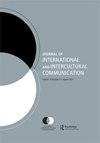Culture and social norms: Behavioral decisions about grassland conservation among ethnically Tibetan pastoralists
IF 2.2
Q2 COMMUNICATION
Journal of International and Intercultural Communication
Pub Date : 2021-05-04
DOI:10.1080/17513057.2021.1916569
引用次数: 2
Abstract
ABSTRACT Conceptions of what is typical (descriptive norms) and socially appropriate (injunctive norms) are constrained by culture. Based on interviews with Tibetan pastoralists in Western China, we examine social norms and behaviors associated with managing domesticated animals. We describe the ways that behavioral decisions are influenced by interpersonal communication and observation of norms, along with ecological, market, and policy forces. Explicit communication about norms occurs primarily under problematic conditions, in times of change or policy introduction. Findings reinforce the relevance of understanding the culturally bound dimensions of social norms and the need to ground theory and research on social influence in intercultural communication concepts.文化与社会规范:藏族牧民草原保护的行为决策
典型(描述性规范)和社会适宜性(禁令性规范)的概念受到文化的限制。基于对中国西部藏族牧民的访谈,我们研究了与管理驯养动物相关的社会规范和行为。我们描述了行为决策受人际沟通和对规范的观察以及生态、市场和政策力量影响的方式。关于规范的明确沟通主要发生在有问题的情况下,在变化或政策出台的时候。研究结果强调了理解社会规范的文化约束维度的相关性,以及在跨文化交际概念中建立社会影响理论和研究的必要性。
本文章由计算机程序翻译,如有差异,请以英文原文为准。
求助全文
约1分钟内获得全文
求助全文
来源期刊

Journal of International and Intercultural Communication
COMMUNICATION-
CiteScore
3.80
自引率
12.50%
发文量
19
 求助内容:
求助内容: 应助结果提醒方式:
应助结果提醒方式:


